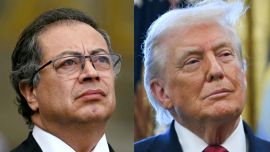The government has asked the Central Bank to start an aggressive new defence of the peso on Monday, after the currency fell 26 percent in August, driving the country closer to default.
The peso collapsed after primary election results showed the market-friendly government has little chance of retaining power in October’s polls, raising concerns among investors of an impending default and pushing Argentinians to seek the safety of hard currency.
Investor fears are already becoming real after the country last week pushed back maturities on local short-term debt, drawing default tags from S&P Global Ratings and Fitch Ratings. The weaker peso makes it harder for the government to pay back debt coming due in dollars.
In May a year ago, the Central Bank was able to temporarily halt the peso’s collapse by offering to buy US$5 billion, a huge amount in Argentina’s thin currency market. Monday’s measures may echo that plan, newspapers Clarín and La Nación reported, citing government sources they didn’t name.
Former president Cristina Fernández de Kirchner, who is running as the vice-presidential candidate on what looks like the winning ticket for October’s election, slammed the mostly-orthodox economic policies of President Mauricio Macri, saying that Argentina should “never again” turn to “neoliberal” ideas.
Fernández de Kirchner refrained from policy specifics at a book launch in La Plata on Saturday, but she criticised Macri’s open capital account and track record on employment, saying that Argentines were better off when she was in power.
On Friday, the Central Bank said lenders would now need to ask permission before making dividend payments. The measure may help reduce demand for dollars after the country’s international reserves plunged US$900 million on Thursday. Further capital controls may follow as authorities try to stop money from leaving the country.
Average daily volume in peso trading was US$2 billion in 2016, according to the Bank for International Settlements. Volume on the local electronic market has averaged US$416 million a day in the past six months, but has fallen even further since the primary elections on August 11 to an average of US$240 million.
Argentina is the biggest borrower in the Bloomberg Barclays EM Sovereign index by par value, though the current market value of its US$61 billion of bonds in the index has fallen to just $24 billion as investors fret they may not get their money back.
As well as pushing back maturities on local short-term debt, Argentina says it will also ask holders of $50 billion of longer-term debt to accept a “voluntary reprofiling.”
related news
by Sebastian Boyd, Bloomberg























Comments